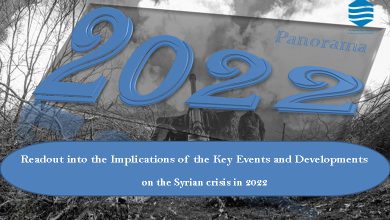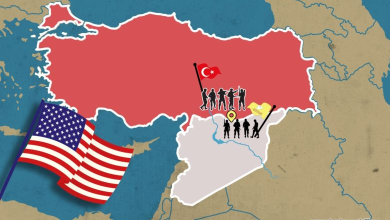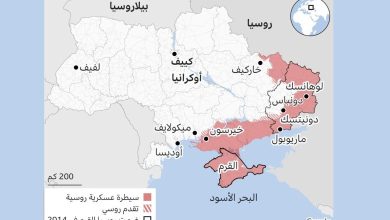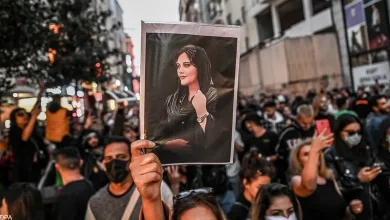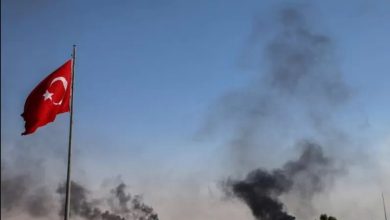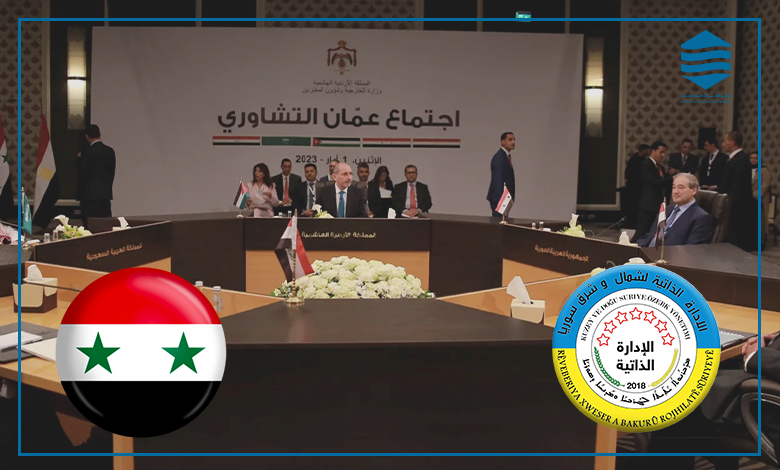
Recent Rapprochements in the Region and its Repercussions on the AANES
Lezgin Ibrahim: A researcher at Al- Furat Center for Studies
Al- Furat Center for Studies- Translation Department
The Middle East region has been witnessing recently a wave of reconciliations and normalization between conflicting and competing powers and governments. Mainly, the normalizing ties between Iran and the Kingdom of Saudi Arabia (KSA), and what accompanied with it the revision of many Arab countries of its relations with Damascus, which led to bringing it back into the Arab League, after nearly 12 years, in addition to Turkish new tendency to normalize ties with both of Damascus and Cairo, and Gulf countries and Israel.
These developments are considered a turning point in the relations that has its repercussions and direct impacts on the regional conflicts, and imposes variations on all governments and powers present in the region.
Since the Autonomous Administration of North and East of Syria (AANES) is part of Syria, which is considered an Arab country, these reconciliation processes and normalizing ties between Arab governments and Turkey and Iran, and Arab governments restoring ties with Damascus, have direct impact on the Autonomous Administration and the Kurds in Syria, in this article we are going to highlight the repercussions of these reconciliations on the Autonomous Administration.
This is a comparison between reconciliations’ repercussions on the Kurds previously and the Autonomous Administration currently.
When the Turkish U-turn towards Damascus began, and what resulted in holding of tripartite meetings mediated by Russia, and then quadruple meetings with the participation of Iran, observers had the same expectations in its assessment that it has negative implications on the areas of the Autonomous Administration and the Kurdish file in Syria, given that the main file that Turkey put on the table of these meetings, is the fight against the Autonomous Administration and the Kurds in Syria, but does this assessment apply to the recent wave of Arab openness to Damascus and its reconciliations with Iran and Turkey?
The answer to this question requires going back to the history of similar reconciliations between the Arab States and both Iran and Turkey, and the implications they have had on Syria’s Kurds at the time, and then comparing them to the current situation and drawing possible implications based on the current circumstances and realities on the Kurdish, regional and international levels.
Historically, this wave of reconciliations reminds us of the Arab mediation to put an end to Iraq and Syria’s disputes and crises with both Iran and Turkey, which had negative implications on the Kurds in both countries.
The first agreement was the Algeria Accord (Agreement) on 6 March 1975, when the Algerian president, Houari Boumeddin launched an initiative to resolve the Iraqi-Iranian difference, bringing Saddam Hussein and Iran’s Shah Mohammed Reza Pahlavi together. They agreed that the talks would address two main issues; putting an end to the Iranian support for the Kurds and the final demarcation of the land and river borders between the two countries. This agreement is considered one of major setbacks that the Kurds experienced and led to the fall of the Kurdish revolution.
The Second one was Adana Agreement on October,1988, when the tension was escalated between Syria and Turkey at the time of the former Syrian president’s rule, Hafiz al-Assad, following a crisis led Turkey to mobilize its forces on the Syrian border, aiming at conducting a military action, however, it was stopped due to the mediation of the Arab League, Egypt and Iran, the Egypt’s president, Hussni Mubarek played a mediator role between Ankara and Damascus, which resulted in the Adana Agreement, which it was and is still being used by Turkey to assault the Kurds in Syria.
Obviously, the Arab States mediation, to end the conflicts between both Iran and Turkey from one side and the two Arab countries; Syria and Iraq, was at the expense of the Kurds. However, Do the Arab current reconciliations with Iran and Turkey, after the more than a decade of boycott with Damascus, be able to repeat the scenarios of the both “Algeria and Adana” agreements against the Kurds and the AANES.
We can conclude the implications of these reconciliations on the Autonomous Administration through assessing three factors, which are the reasons and aims behind normalizing ties with Syria, the Kurdish situation and their project for the time being and the American and Western positions concerning the latest developments in Syria.
First- The reasons and aims beyond normalizing ties with Syria
If the Arab States previously used to give away the Kurds as “scapegoat” for the sake of reconciliations with both Turkey and Iran, in order to protect the ruling regimes in Syria and Iraq, the current situation is far more complicated, and the Kurdish card is no longer enough for this. Subsequently, this momentum of Arab States’ restoring ties with Damascus, especially, after the Saudi-Iranian reconciliation, is due to its concerns of losing Syria as part of the Arab world (homeland), because there is no bond remained with Syria, except for its formal name “the Syrian Arab Republic”, but Syria has been separated geographically and politically from the Arab homeland, for more than a decade by Turkey and Iran. Paradoxically; the only part of Syria that remains out of the danger of both occupiers; Turkey and Iran, is the Autonomous Administration’s region, in which it is being administered by the Kurds with the participation of Arab and the other components in the region.
Thus, the Arab returning to Damascus and the accelerating steps to reopen their embassies to Damascus, and bringing Damascus back into the Arab League on 17 May 2023 are part of Arab States’ concerns about Iran and Turkey’s hegemony on Syria. This indicates reconciliations between Arab States and Turkey – Iran are just tactical ones that have been imposed by the international variations and Ukrainian war, and the escalation of the Israeli-Iranian conflict in the region. In fact, the Arab States do not have trust with Iran, therefore, they want to bring back Syria into its fold, or at least restore their presence in Syria.
Since the Arab States are being aware of the fact that both of Iran and Turkey have lasting occupation aspirations in this Arab country, and it is not mere ambitions to extend their influence the same as Russians and Americans, therefore, it was notable that the Arab countries, during their meetings with the Syrian regime’s representatives or the Turkish and Iranian ones, would not attack the Autonomous Administration or the Kurds in their statements, on the contrary, even when they talk about the necessity of fighting “Terrorism” in Syria without identifying who are the “terrorists” that they should be fought. However, the realities indicate that they do not mean the SDF forces, because no one of the Arab countries, neither before the reconciliation wave, nor after them, labeled them as “terrorists”. Whereas, they label many Turkish and Iranian backed groups, factions and militias as “terrorists”, the positions of Arab States are in favor of the Autonomous Administration, even if the Arab countries have not opened direct relations with it yet.
This means that the Arab States are willing to maintain Syria this time, but not the Syrian regime; that is why the Riyadh and Oman meetings did not result in the Arab decision to complete the normalization process with the regime. Jordan and Egypt’s refusal to bring back the regime into the Arab League was not something weird, before it shows its willingness towards the political solution. Jordan took the decision to open a trading border crossing with the regime in return for the regime’s combating of Captagon trafficking into Jorden. On contrary, this step only helped in increasing smuggling operations; Jordanian authority had dismantled a new attempt to smuggle drugs from Syria to Jordan the day before holding the consultative meeting, this is what pushed the Jordanian foreign minister, Ayman al-Safadi, to hint at the possibility of conducting a military operation inside Syria in order to stop drug trafficking, if the Syrian regime’s failing to fulfill its pledges, according to CNN network on 6 May, 2023.
Therefore, Jordan will not accept the normalization of the regime, unless it takes practical steps in combating drug trafficking, solving refugees’ files and ensuring a secured return for them to Syria.
As for restoring ties between Egypt and Syria, it was obvious from the statements of the Egyptian foreign Minister, Sameh Shoukry, the day before “Jeddah meeting”, when he reiterated that the regime should be committed with the political solution based on the No. 2254 international resolution, this indicates that Cairo has not seen, from Damascus side, what could be assured about this issue during Shokry’s visit to Damascus and Miqdad to Cairo.
One of Egypt’s indirect aims of restoring ties with the Syrian regime, could be its desire to take advantage the current circumstances, in order to distract and weaken Muslim Brotherhood movement, whom took control of the “Syrian opposition”, that is what made Egypt, UAE and Saudi prefer him to the “Brotherhood” opposition and the rest of terrorist organizations funded and backed by Qatar -Turkey states, in spite of, all of their misgivings on Assad’s negative positions towards the Arab States. Since both Turkey and Qatar try to normalize ties with the Arab States, they were obliged to marginalize the “Brotherhood” organization at this phase. Thus, Egypt has had the opportunity to get the “ Brotherhood” out of the Syrian equation, especially their international organization currently suffer from distraction and divisions after the death of “Ibrahim Munir” , the group’s acting Supreme Guide, this created a conflict between both leaderships of Istanbul and London concerning who would be Munir’s successor, and it was unprecedented move in the history of this movement, every front had announced the “acting Supreme Guide” separately, everyone does not recognize the legitimacy of the other. Subsequently, all of these circumstances are appropriate for such moves by the Arab States, in order to abort all of the “Brotherhood” projects in the Arab States.
Undoubtedly, Assad’s floating would mean Arab States withdrawing the legitimacy from the Brotherhood-led “Syrian Coalition opposition”, this also would be considered a card that would be in favor of the Autonomous Administration, which would stand out as a patriotic Syrian opposition, and it could participate in the Syrian solution.
Whereas, the Egyptian position, which insists on the Turkish withdrawal from Syria, could have positive implications on the Autonomous Administration.
Second- The Kurdish status and their current project
Some of Arab governments joined previously both of Turkey and Iran in sealing agreements against the Kurds, one of the reasons of this Arab’s tendency is related to the Kurds themselves, in terms of their fragile political and economic situations and projects and theses of their political parties, such as the call for “Founding the greater Kurdistan”, and building the national homeland for the Kurds. No matter of “ the legitimacy of these demands”, it gave the hostile states of the Kurdish cause pretexts to legitimize their fight, and described the Kurds as separatists and rebels of the legitimate and internationally recognized governments, and they pose a threat to the national security of those states. Therefore, those governments’ fight against the Kurds is based on the international laws; it was considered as internal affairs of those states. Thus, the international powers did not interfere, to protect the Kurds, since their calls did not comply with the interests of superpowers. This is what encouraged the nationalist and religious- oriented Arab governments, in particular, to join agreements against the Kurds with a straight face.
Nevertheless, the Kurdish circumstances are different at present; the political and military situations and the Kurdish political speech in Syria have changed and have become more powerful and mature in all aspects, comparing to the past decade, we can summarize this as the following items:
1- Militarily
The Kurds were able to break all the restricts and the stereotypes of armies, which serves the nationalist and religious authorities in the region, by participating Arab , Syriac and the rest of components and denominations in the formation of the Syrian Democratic Forces(SDF), which has become a partner with the US-led international coalition forces, SDF has proven its capability in the war of combating terrorism and protecting the peoples of the region, and it constituted a model for the Arab and Kurds’ ability to unite in the face of the challenging risks and threats.
Subsequently, Arab and Gulf States do not deal directly with (SDF), however, they are aware of the fact that these forces have become the only bright model in Syria, that differs from the sectarian-oriented “Syrian Army”, which is being controlled by Iran and its militias, and it differs from “opposition factions and the rest of extremist jihadi groups, which are being controlled by Turkey or Iran to obliterate (SDF), which Arab tribes constitute its majority. Therefore, any setback for the (SDF) means delivering what is left of Syria to Iranian proxies and Turkish-backed terrorist groups and factions, which is something Arab States do not want to happen.
Politically:
On a political aspect, the Syrian Kurds have proven their right vision by adopting the “Third Line” in the ongoing conflict and crisis in Syria. they neither stood by the Syrian regime against the revolution nor insisted on the regime’s toppling demand, in the meantime, they never subjugated to Turkey as the Syrian opposition did, which finds itself in an embarrassing situation after Turkey returned to normalize ties with the regime.
Whereas, the Kurds adopted a new approach that differs from the stereotype of classic Kurdish parties, and the Kurds’ introduction and adoption of the project of Autonomous Administration with the participation of various segments in the administration of the North and East of Syria(NES), without any kind of exclusion and racism, was a political step that invoked concerns of the hostile parties to the Kurds, which pushed to describe them as “separatists” in order to legitimize their war against them and to keep the other components away from this new project.
Ironically, this project introduced by the Kurds proved that it confused the hostile regimes of the Kurds more than any national Kurdish project; when the Kurds demanded their national rights, the government denied the Kurd’s existence and their cause in Syria. However, when the Kurds replaced those demands with the Autonomous Administration project, in which all components participate in managing and protecting their region, the hostile regimes and parties to the Kurds began to insist on describing the Autonomous Administration as “Kurdish administration” and describing the (SDF) as Kurdish units or even militias, in order to give it nationalist sense, to keep Arab and the other components away, to continue to accuse the Kurds of rebellion and as separatists, and they pose threats on the national security of Syria and neighboring countries, to continue in legitimizing the process of killing and fighting the Kurds, and preventing the international community and Arab States in offering any political recognition of this Administration, or any kind of official engagement with it.
However, the political maturity of the Autonomous Administration’s representatives push them to put an end to those allegations and proved its fallacy and confirming that this is a national Syrian project and it complies with the international resolutions, by the announcement of the Autonomous Administration, in parallel with the momentum of the Arab open-door policy, on 18 April 2023, an initiative to get to a peaceful political solution for the ongoing crisis in the country, and it includes all parties and complies with the international resolution, especially, 2254 resolution.
This initiative, at this timing, is considered a smart move by the Autonomous Administration that embarrassed the Syrian regime and Turkey, which included nine terms, such as the recognition of the integrity of the Syrian territory, adopting a decentralized model of the ruling, a fair distribution of resources amongst all parts of Syria, willingness to receive Syrian refugees in its areas of control and fighting terrorism and terrorist organization, all these steps throughout the intra-Syrian dialogue with international and Arab support, leading to achieving stability in the country.
This initiative gains momentum because of its adoption of the international resolution,2254, which matched the Arab States’ position concerning the Syrian crisis, you can notice visions match between this initiative and the outcomes of the final statement of Oman consultative meeting for Syria: “this meeting is the beginning of many consecutive meeting would be followed to begin negotiations aiming at finding a solution for the Syrian crisis, in a way that complies with the security council resolution,2254 and addressing all humanitarian, political and security consequences of the crisis.
As long as, the international resolution No.2254, which the Security Council voted on 18, December 2015, states the beginning of peace negotiations in Syria and the formation of an interim government, conducting internationally supervised elections, and ceasing any attacks against civilians. Thus, the Autonomous Administration’s position is similar to the Arab position means the normalization with Damascus would have positive consequences on the Autonomous Administration; this would give some Arab States the opportunity to open a serious dialogue between Damascus and the Autonomous Administration, and the Arab States insistence on adopting the international resolution to solve the Syrian crisis, and the fact that normalization with Damascus does not mean the rehabilitation of the regime, nor consolidating Assad’s ruling of Syria, since the international resolution focuses on the “transitional period, and “free” elections supervised by the United Nations after this transitional period, which is 18 months. Therefore, it can be notice that the regime is evading from the resolution No.2254, since he is knows very well that this means his end gradually.
Ultimately, even Damascus’ return into the Arab fold would not have any impact on the status of the Autonomous Administration, since Damascus return does not mean Arab’s Consensus on the sustainability of the ruling regime over Syria, rather, it would mean a step towards the political solution.
Third- the US position and presence
There is no doubt that the US presence within the international coalition and its partnership with the (SDF) in Syria, has a major role in making Arab States do some calculations in making any decisions regarding the areas of the Autonomous administration, sealing any agreement with Turkey, Iran, and Damascus with regard of the Kurds, must obtain the US consent, since without that consent, all agreements would not have any impact on the US presence in Syria.
The Arab openness to Damascus gets implicitly the US consent; the US considered that the Syrian regime do not deserve to return to the Arab League. However, it did not put any pressure on its allies in order to prevent them from normalizing with the regime. Joel Rayburn, the former US special envoy for Syria, said: “senior US present administration’s officials have implicitly given some Arab countries the green light to normalize ties with Damascus”, he stated, “the Biden-Administration preferred normalizing ties with the regime rather than Russia’s sponsoring a “Deal” between Damascus and Ankara”.
This consensus between the US and Arab States was clear in Vedant Patel’s statement, the US State Department Principal Deputy Spokesperson, in a press conference,” the absence of clear progress towards the political solution for the conflict in Syria, and we continue to clarify this secretly and publicly with our partners”.
He added, “We believe there must be tangible steps should be taken, including getting access to sustainable humanitarian aids independently and can be predicted, undermining the role of Iranian Revolutionary Guards Corps(IRGC) in Syria, putting an end to the destructive Captagon trade and making a real progress on the political track”. These American demands are similar to the demands of “Jeddah Summit” outcomes in Saudi, which means that this Arab opening, Saudi in particular, was with American consent, subsequently, the Arab openness on Damascus would have positive effects on the Autonomous Administration.
Whereas observers’ interpretation of this momentum of Russia, Iran, Turkey, and the Arab States moves in the Middle East and their rearranging their relations and normalizing ties, amid the US and Western reluctance in the region, is an indicator of the US vulnerability in the region, they even expect the US withdrawal from both Syria and Iraq due to these changes, which are unreal interpretations, since the reconciliations momentum was primarily as a result of the vulnerability of these governments, in the political and economic fields in particular that pose a threat all governments; Erdogan, the dreamer of an empire that brings back the Ottoman glory, have been well-aware of his failure, and the Tehran rulers of the glory of the Persian empire are also well-aware of their failure, and Putin who is being drowned inside the Ukrainian swamp, is well-aware of hardships facing him, and everyone is looking for a face-saving way out.
Contrary to the common belief, the US consolidating its long-term existence in the region, and confirms supporting its allies in confronting all threats, the Iranian threats in particular. During his visit to Israel, on 27 April 2023, Michael Corella, the US Central Command Commander(CENTCOM), revealed in a statement,” the central challenge he faces as (CENTCOM) leader, is to refute the belief that the US is leaving the Middle East, and calming America’s allies concerning the Biden-Administration’s Commitment towards the security of its allies, confirming its pursue to consolidating cooperation amongst the allies to confront the Iran and its backed militias’ attacks by rockets and drones, which have become a central threat to the United States, Israel and Arab States”.
Overall, it has no longer been a secret that America, Israel and the West will not lunch traditional wars against the States that will fail to catch up with the ongoing changes internationally, such as Russia, Iran and Turkey, in order to change them. The war is an old-fashioned option, and its alternatives are easy and not expensive; the economic blockade, drugging them into attrition wars with their neighbors, i.e. as if the US leaves them to be wilted and drained out, and then they will fall by themselves.
Insight and recommendations
It can be noticed that the Arab openness on Damascus is aimed at finding a political solution, moving to the elections based on a new constitution, which would identify the period of the president’s term and his powers, under an international, Arab supervision or joint supervision of both of them, which would mean restricting the regime’s role in the country’s future.
It seems that the regime believes any progress in a political solution in accordance with international laws, even by one-step, means his closeness toward his fall. Subsequently, the principle of “step-for-step” on the Arab level would be crushed by many local obstacles to the Syrian solution, not to mention dozens of law and political obstacles on the Arab and international levels, at the forefront, comes three conviction against the regime, the use of chemical weapons and demands of holding the regime accountable after the political solution.
The return of normalization between Turkey, Iran, Damascus and Arab States indicates in one of its aspects the failure of those parties’ projects to resolve the crises in the region. Nationalists have tried to promote ideology and failed. Turkey, the Brotherhood Movement and Iran have tried to promote religious projects and have failed. The Autonomous Administration project emerges as a model that can be taken as a basis for a political solution throughout the adoption of a decentralized system in Syria.
If there are those in Damascus – or abroad – who expect to bring the bipolar trade conflict between China and the United States back to the world, this will take a long time, because neither China does wish to confront, having picked the fruits of openness and globalization, nor does the United States also wish to escalate tension. China, which recently recovered from coronavirus to save its economy, is looking for economic partners and markets for its products, and it is not interested in the color, religion and creed of those partners.
Amid all these changes and circumstances in the region, all Kurdish forces and parties in Syria and beyond must reconsider their political and media discourses towards each other and accelerate consensus on a unified vision, so that they can play an active role in initiating any step toward a political solution in Syria.
The Kurds must also get rid of the “oppressive” complex and the belief that all the world stands against them because the facts showed whenever the Kurds were able to develop in both political and military fields, the chances of obtaining international and regional support are increased, The Kurdish formation of the People’s Protection Units(YPG and Women Protection Units(YPJ), the demonstration of their capacity to fight terrorism and protect their regions, pushed the US and the International Coalition to partner with them, therefore, the Kurds are required to strengthen and develop their political status so that they can gain international and regional political support as well.
The Autonomous Administration initiative is distinguished and applicable. It does not set preconditions for any steps toward a solution. According to the initiative, the solution is what Syrians agree upon via dialogue. This position of the Autonomous Administration is the most important in the text of the initiative, which shows there are no red lines for them. Hence, the Syrian Democratic Council (SDC) must take this initiative, move on, and put it at the table of the international and Arab powers, in order to clarify and explain all its items to realize that this initiative takes place within the framework of UN Security Council Resolution 2254. Thus, all misperceptions, doubts and concerns of some international powers and Arab Governments about the positions of the Autonomous Administration shall be removed.
If Arab countries return to normalization with Assad, who is Iran’s ally and preferred it to the Syrian opposition and its factions because of the hegemony of the jihadists and Brotherhood movements, they had better prefer the Autonomous Administration and the (SDF) to them. However, it is the absence of international political recognition of the Autonomous Administration yet and the sensitivity of dealing with the Kurds in Syria at this phase that prevents Arab States from demonstrating their acceptance of this administration and their military forces and their preference over other parties.
Therefore, in the event of any formal recognition of this Administration and its military forces under an international umbrella, the majority of Arab Governments, especially the Gulf, will certainly rush to open relations at all levels with it, similar to their relations with the Kurdistan region after gaining international legitimacy.
